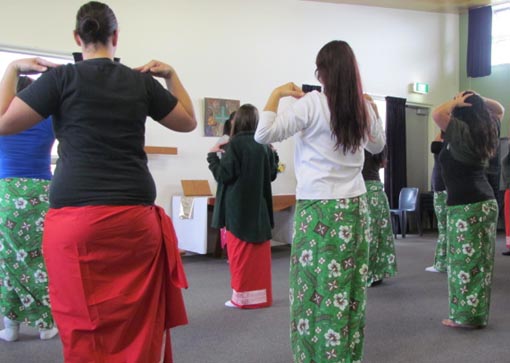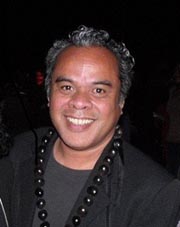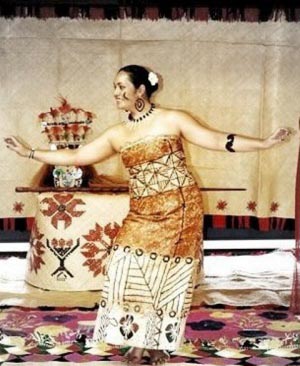Dance programme for women prisoners to expand
20 November 2012

A programme teaching drumming and dance to prisoners at Auckland Region Women’s Corrections Facility was so successful that Pacific Dance New Zealand will return to the prison next year and also take its programme to Spring Hill Corrections Facility next year.
 Spearheaded by its director and choreographer, Iosefa Enari, Pacific Dance New Zealand volunteered to run an eight-week performance programme with 30 women at Auckland Region Women’s Corrections Facility (ARWCF). Over that time, they taught drumming, along with Tahitian and Samoan dance, to the women.
Spearheaded by its director and choreographer, Iosefa Enari, Pacific Dance New Zealand volunteered to run an eight-week performance programme with 30 women at Auckland Region Women’s Corrections Facility (ARWCF). Over that time, they taught drumming, along with Tahitian and Samoan dance, to the women.
In between the weekly sessions, the women practised under the guidance of Corrections’ staff. The programme culminated in a performance, attended by other prisoners and Corrections’ staff.
For Pacific Dance New Zealand, the programme was overseen by Iosefa Enari , Filoi Vaila’au (Samoan tutor), Wendy Vannes (Tahitian tutor), Aaron Taouma (Tahitian support tutor) and Amo Ieriko (drumming tutor).
For Corrections, staff members Doug Kerr and Francine Benefield set up and managed the project. Francine, former Volunteer Co-ordinator at ARWCF, says she was “blown away” by the results.
“The programme was brilliant and the women were totally engaged from the outset. For many, it was a chance to reconnect with their cultural roots and learn the meaning of the dances,” she says. “The women were so respectful of each other and the tutors. I was very proud of them.”
Francine, now Volunteer Co-ordinator at Spring Hill Corrections Facility, has kept in touch with the Auckland dance company and invited it to run a similar programme with the men at Spring Hill in 2013.
Iosefa Enari talks to Arts Access Aotearoa about the challenges, the rewards and the skills the women learned.
Q: Why did Pacific Dance New Zealand volunteer to teach this programme?
A. Our organisation is based on community values. We’re not just about professional development within the dance sector. We’re also about engaging with the wider community and sharing Pacific dance and its values in every sphere of the community – including prisons.
Q. What did you get out of the project?
 A. For us, this was an extension of the children’s classes we run during the school term. The enjoyment of dance that we see on the faces of our kids and their parents is the same enjoyment we saw on the faces of the women at ARWCF. It was really encouraging to see.
A. For us, this was an extension of the children’s classes we run during the school term. The enjoyment of dance that we see on the faces of our kids and their parents is the same enjoyment we saw on the faces of the women at ARWCF. It was really encouraging to see.
This was our first time in a prison enivronment. Initially, we were a little unsure but we all really wanted to give it a go – I guess to make a difference. After a great induction process and getting there and into our programme, the reaction from the women was superb. We could see a positive reaction right from the outset and by the end the girls were just beaming.
Q. What were the aims of the programme and did you achieve them?
A. This was a pilot programme, all done on a voluntary basis by our tutors and supported by Pacific Dance New Zealand. We wanted to see if a programme like this could work. We think it did work and believe that there were positive spin-offs in terms of the attitudes, the skills they learned and the environment it created. That was our aim – just to share a little, give the girls something to feel good about, and learn some dance at the same time. It also set up a structure that we’ll follow, possibly with a little adjustment, when we travel to the men’s prison at Spring Hill and return to ARWCF in 2013.
Q. How did the women respond?
A. The women were really co-operative and into what they were doing. The positive reaction from the tutors was also really great to see. Initially, we weren’t going to go back to ARWCF so we could focus on our men’s programme at Spring Hill. But that meant we couldn’t take our female instructors and they were so keen to do it again, they volunteered for a second time and said they would run the programme at ARWCF and add elements not covered the first time.
The final performance wasn’t just a proud moment for the women. The tutors were also very proud of what they had achieved in the time they’d had. And they were overwhelmed with the very gracious, positive and thankful response from the prisoners at the end. It really just topped everything off for us.
Q. Where to from here?
A. We’re off to Spring Hill next year with our men’s programme. This promises to be more of a challenge with a larger group involved. We’re planning to add some dimensions to the programme such as more focus on music and possibly singing, as well as dance. The desire to continue with the programme – from Corrections, our tutors and our networks – is a really positive sign that the pilot programme was successful.
Spring Hill will give us a chance to try out other aspects and expand the programme. We’re keen to develop a curriculum for the programme with a certificate that prisoners could get when they have successfully completed a course. We’ve committed a good two to three years to this and yes, it’s all volunteer service. It’s us giving back where we can.


